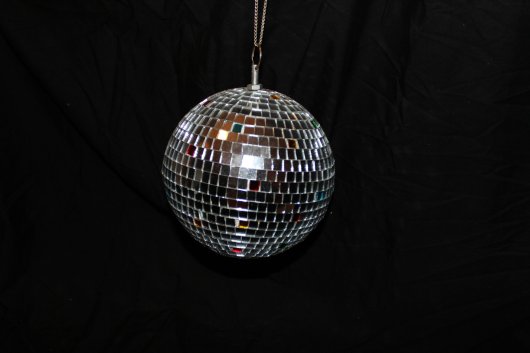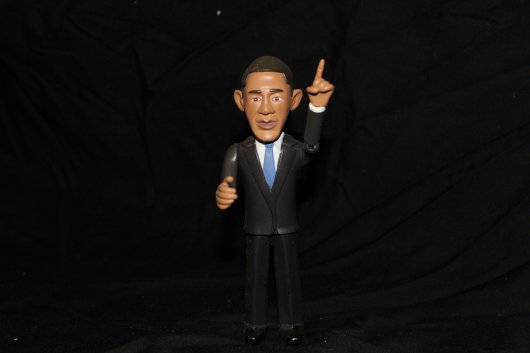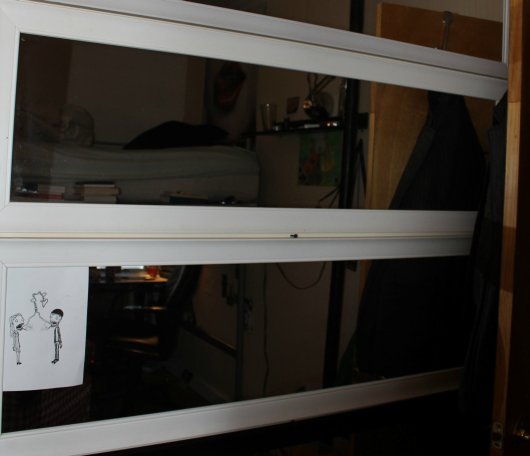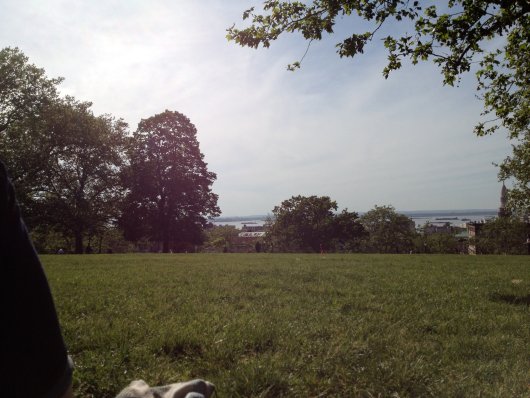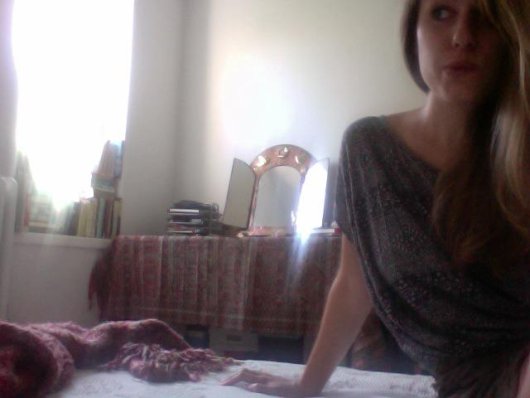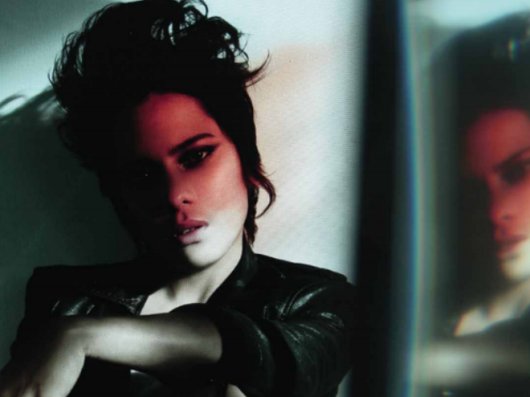 NEW YORK
NEW YORK In Which We Unveil A Mercury-Based Map
 Thursday, July 5, 2012 at 10:58AM
Thursday, July 5, 2012 at 10:58AM This is the conclusion of a two-part series. You can find the first part here.

Dances With Something
by LUCY MORRIS
New York was the first place I moved in with someone, and also the first place where I moved out. The moving in happened in increments, some clothing here, an extra phone charger there, until everything I owned was in a house I couldn’t recall having made a formal decision to live in. I moved out in just one afternoon. As I steeled myself for it, I thought about how people speak as though making commitments is the hard part, when actually extricating yourself from them is considerably more difficult. But once I knew I could do the latter, once I could see there would always be an out, it seemed suddenly that everything was available to me, that I could try almost anything I pleased without lasting repercussion. New York is a dangerous and ideal place to have this realization: there is no limit on what to try.
I left my boyfriend’s house in Bay Ridge on an unseasonably warm spring day. My best friend had borrowed someone’s SUV in exchange for a bottle of scotch. We drove along a straight stretch of Brooklyn we usually only passed beneath by train. I felt the weight of what had ended pushing against my lungs, making me want to cry in a terrible way that I thought would never end and, in truth, didn’t for a while. But my feet were on the dash — something so rarely experienced in New York that it seemed double the pleasure — and Catherine was next to me, her familiar freckled hand guiding the gearshift, and I could in some small way already sense the breadth of what was ahead, not just the wide avenues laid out before us, Ocean and Flatbush and beyond, but all that might happen next.
What did happen next was someone else. I showed him around my new neighborhood like I owned it, even though I knew that I didn’t, that I would, as always, soon be leaving. We walked from Crown Heights to Bushwick one outrageously hot night, and on the way home he drunkenly smashed a forty on a deserted stretch of Bedford. I had a sudden, strong impulse to run, not because I was scared of him physically but because it seemed that if he could injure these streets I loved — and I knew the cement had no nerve endings, that this was irrational — he could injure anything in his path, anything else I might care for.
I was by then starting to think I could no longer share parts of myself with another person at all, but I especially could not share my time with New York, which was already starting to run out. I wanted New York to be wholly mine and, to my surprise, the more I felt that it was indeed mine — the more familiar I became with the curving streets in different pockets of Brooklyn, the more afternoons I escaped work early to sit alone in the MoMA’s sculpture garden — the less it seemed I needed anyone else there with me. I had no desire for someone next to me on the sidewalk, slowing my pace. I didn’t care for long subway rides with someone leaning on my shoulder, intending for me to nudge them awake at our stop.
+

On an April evening four or five years in, when I found myself somewhat adrift — I then believed that spending days in an office absolved evenings idled irresponsibly — a former professor took me out for dinner in Nolita. Over a nicer meal than I had had in many months and more wine than I had had, too, she dispensed two pieces of advice. One was: “Never leave your belongings with a spurned lover.” The other was: “Young women need to learn to say fuck you with their mouths and not their bodies.”
I took the subway back to Brooklyn afterward a little tipsy and feeling better than I had been, as if equipped with these recommendations I could now start life, or at least the summer we were on the cusp of, anew. I had already violated the first piece of advice and my possessions had not been burned or dumped on the lawn, as my teacher suggested, but even that might not have been as bad as the consequences of ignoring the second piece, which I continued to do, not in great numbers but for a while longer than I should have. There was a period when I wanted to say fuck you to almost every guy I knew in New York, mainly for their failure to be the one I wanted who was at that time far away, and often I did say it with my mouth but usually only after too many drinks, and then I’d wake up the next day in their beds anyway, thinking about my professor and how I’d disappointed her. That was easier to think about than the fact of having disappointed myself. When you wake up with a thought like that, it is almost impossible to get out of bed.
My weekday commute was over an hour each way, but the Saturday and Sunday mornings when I had to climb out of someone else’s bed and go home seemed to be the longest subway rides of all. I never hated New York more than in those hours: hung over on the R train, slumped in the hard orange seats, eyes shut tightly and hands pressed to my ears, as if that resistance to the present could alone block out the morning mariachi band and whatever awaited me at the end of the line.
Sometime later I became unable to ride the Brooklyn-bound R at all, went dramatically out of my way to avoid its crackly announcements — Next stop Union — that filled me with a disproportionate sense of doom. I developed many of these fastidious avoidances in New York, of entire avenues and certain bars or restaurants and several different movie theaters. I found that these self-imposed restrictions were not limiting but instead enriching: making certain places off limits to myself not only created urban obstacle courses I secretly found satisfying but also made the places I deemed available that much better, that much more mine.
+
I could make these road maps of places to avoid and places yet to go, but they were constantly changing. The restaurant on Avenue A where Catherine and I often ate lunch one summer mystifyingly moved a single block south without announcement. Bodegas stopped carrying the right ice cream so you had to find another; library and café hours changed; my own place in the city kept rotating and, accordingly, so did the plot of private markers radiating out from where I lived.
The years, whatever new homes and relationships and routines they each contained, began to stack up and I became increasingly aware that for those whose nostalgia is primarily rooted in personal geographies, New York is a complicated place to make your home. You want, selfishly, for a neighborhood, a landmark, a street to stay static as a background to your memories: you may have changed, but you’d like the place to remain as a monument to the person you were there. Twice I moved out of neighborhoods just before many of my friends moved in, and this meant I was often returning to places I had once lived and confronting what had changed (to consider if I had) and to see what had stayed the same (to wonder if I had, too).

I noticed one night on my way home from a party in Brooklyn that my old bodega on Nostrand had acquired a neon sign that flashed “GOURMET.” I thought of all the sandwiches I’d bought there to take home to my dank basement apartment nearby, and also of the produce store down the street where a guy I was seeing bought me a pineapple I later proceeded to vomit on his lap, and the many nights I padded home past the Key Foods, the smoothie joint, the check cashing-turned-pizza place. I had been so finely attuned to my surroundings without even trying that it seemed not inconceivable that it was mutual, that the streets — Sterling and President, Franklin and New York — would still hold some of the mistakes I’d been trying to forget. But everyone knows streets are just streets and after a while they ceased to remind me of anything, were merely courses I followed to barbecues, bars, and readings, not to deeply nested parts of my memory.
This ability to detach on demand, familiar to people who move frequently as children, is superbly freeing. It’s also hard not to imagine that it is in some way deeply damaging, that after a while it starts to ruin you for a more fixed, a more definite type of life.
+
I know that eventually I will force myself to forget these things — erasure being the simplest way to reconcile the past with the present — which is why I make note of them now:
There was a Thai restaurant on Second Avenue that I thought resembled a spaceship where I ate immediately before and immediately after the dissolution of my most significant relationship. In the midst of an early July heatwave my brother came to visit and we walked from 23rd Street down to Chinatown and back up, stopping for two movies and three meals along the way, all the while groaning and blaming each other for our discomfort. We had large parties in our narrow St. Marks Place apartment, with cases of $5 champagne and 5 lb. boxes of pastries, and there was always a moment when I sank into the couch in my party dress as things wound down around 3 or 4 AM, resting my head in my hands, listening to the late night chatter of those who had stayed. There was the birthday I spent at the Russian baths on 10th street and this one Ethiopian restaurant on 6th Street I took boyfriends to, while keeping a different one on 4th Street to myself. Once in a rainstorm I was walking down Broadway when a stranger offered me an umbrella for free: “It’s janky but it works,” he said. There was the time Catherine and I ended up at the North 3rd Street sublet of two 30-something men new to the city, whose financial limitations meant they shared bunk beds, although their budget did seem to afford them the sprouted wheat bread, the Irish butter, the artisan jam they offered us late that night — this being the kind of mildly insane New York contradiction that you can’t get bogged down in if you want to survive.
And then there were the days — in fact, the vast majority — that were totally un-extraordinary, were just going to work and coming home and cooking dinner. But those days were also New York in their own small ways that won’t exist where I’m going next: the exasperating struggle for a seat on the subway, the vegetables picked up at the corner produce store where exotic fruits loomed in crated pyramids, the disturbingly proximate sound of the neighbors’ TV as we turned on our own.
I remember all this and one day I won’t, which is maybe the most New York thing of all, because for a while you can still note that this nail salon used to be a record store you liked, but then the nail salon becomes a trendy bar, and eventually there are only so many incarnations you can hold onto. At some point you move to a different neighborhood, you get busy acclimating to its own distinct features, and you can no longer be bothered with some memory-based map of what was, somewhere you no longer are.
In preparing to leave now for several years, my worry is not that things will have changed when I get back — because inevitably they will — but rather my concern is that I will have changed, that it will all mean and be something different, something lesser when I return. The potential of this loss is overwhelming for me to consider, certainly greater than the loss of boyfriends, friends, belongings along the way. The simplest way to describe it is as the loss of a place where I was very young and where then, in tiny, painful increments, I became a little older. And in leaving the place where I came of age — and the apartments, parks, offices, and avenues therein — it is unavoidable that all the ages I was before will slowly start to fade away.
I believed at the start that the purpose of these paragraphs was to say, in the tradition of many before me, goodbye to a place. But it turns out that these paragraphs instead exist to say goodbye to a certain time. And already things are not what they were when it began for me. For one thing, I ride the R again without second thought; my list of avoidances has, overall, gotten shorter and the list of places I love longer. I see now that there are consequences, but this doesn’t bother me as I might have expected. That skyline-induced rush of good feeling, which comes to me now more frequently than it once did, does not curdle as it did before. It seems I’ve finally found the formula to make it last. That this occurred only shortly before departing is not lost on me, but that’s just it: the great certainty of New York is its uncertainty, the turnover and changes and late-coming revelations being the only guarantees there are. And this is what I fear I will miss the most.
Lucy Morris is the senior contributor to This Recording. You can find the first part of Dances With Something here. She is a writer leaving New York. She tumbls here. She last wrote in these pages about Brighton Beach. You can find an archive of her writing on This Recording here.

"This Is The Kiss" - Gareth Dickson (mp3)
"Get Together" - Gareth Dickson (mp3)
The latest album from Gareth Dickson is entitled Quite A Ways Away.

 dances,
dances,  lucy morris,
lucy morris,  new york
new york 

































